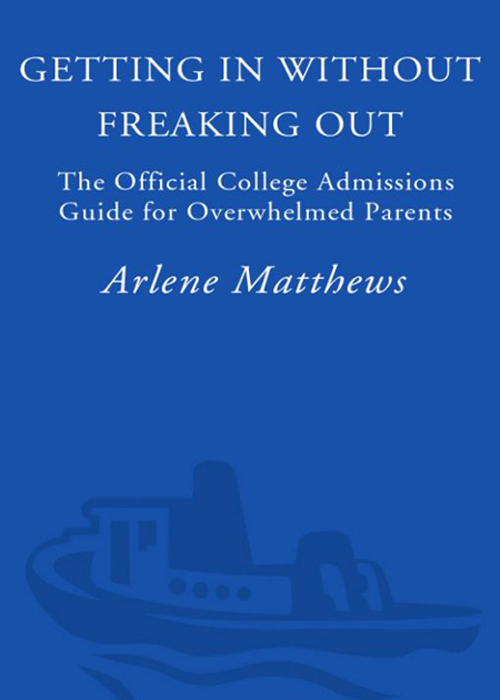

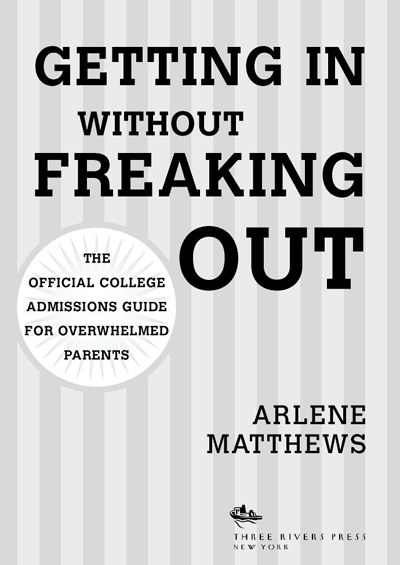
Table of Contents
For Adelaide Moskowitz,
my fourth-grade teacherwherever she is
[I am] deeply concerned about the level of stress among young people as a serious national health issue.
Robin Mamlet
Dean of Admissions, Stanford
The reason Im concerned about this is because were training our children to be the most anxious, stressed-out, sleep-deprived, judged and tested, poorly nourished generation in history.
Marilee Jones
Dean of Admissions, MIT
ACKNOWLEDGMENTS
Id like to thank all of the students and families with whom Ive worked over the years. We have all learned a lot from one another.
Thanks also to my agent, Judith Hansen of Marly Rusoff & Associates, for seeing the potential in this book; to my editor, Kathryn McHugh, for so diligently and skillfully helping to shape it; and to my copy editor, Carrie Andrews, for making me look smarter than I actually am.
As always, Id like to thank my family for putting up with maternal absenteeism as I pounded away at my iMac and fielded phone calls from the college-bound and their eager parents.
During all of this, my dog Max served as a peerless under-the-desk foot warmer. My two cats, Ambie and Recess, contributed their usual editorial expertise by walking across my keyboard at every opportunity. Any typos or awkward phrases are their sole responsibility.
Finallyand no kiddingId like to thank those exceptional teachers who made a difference in my life as well as those who are now making a difference in my sons life. Thankfully, good teachers are to be found everywhere. Running across one is always a blessing.
INTRODUCTION
How This Book Came to Beand What Its For
 A seventeen-year-old junior, determined to get a jump on her personal college essay, fears it will be dull because her life lacks personal tragedy. Why didnt anything bad ever happen to me? she asks her parents. She adds, with a twinge of hope, Do you think it still might?
A seventeen-year-old junior, determined to get a jump on her personal college essay, fears it will be dull because her life lacks personal tragedy. Why didnt anything bad ever happen to me? she asks her parents. She adds, with a twinge of hope, Do you think it still might?
 A disappointed young woman says the reason she didnt make the Ivies was because she was raised to be a BWRK (admissions-speak for Bright, Well-Rounded Kid). Her mom agrees. We should have forced you to take viola lessonsor Mandarin Chineseand not allowed you to do anything else!
A disappointed young woman says the reason she didnt make the Ivies was because she was raised to be a BWRK (admissions-speak for Bright, Well-Rounded Kid). Her mom agrees. We should have forced you to take viola lessonsor Mandarin Chineseand not allowed you to do anything else!
 A senior whose college applications are complete is surprised to receive a congratulatory acceptance letter from a university to which hed not applied and didnt especially want to attend. His beaming mother explains shed forged an application on his behalf... just in case. A spirited argument follows: Whose life is it, anyway?
A senior whose college applications are complete is surprised to receive a congratulatory acceptance letter from a university to which hed not applied and didnt especially want to attend. His beaming mother explains shed forged an application on his behalf... just in case. A spirited argument follows: Whose life is it, anyway?
 A couple who has already hired me as their sons college coach at the end of his sophomore year calls to apologize: We gave your name to our friend for coaching, but then we gave her the wrong phone number. We dont want you to work with that family. We think their son and ours might end up applying to some of the same places.
A couple who has already hired me as their sons college coach at the end of his sophomore year calls to apologize: We gave your name to our friend for coaching, but then we gave her the wrong phone number. We dont want you to work with that family. We think their son and ours might end up applying to some of the same places.
Are these case studies of dysfunctional families? Are they out-takes from a new reality show gone haywire? Unfortunately, no, and no. Theyre actualand all too typicalscenes from perfectly normal parents and kids caught in the throes of what might be called college admissions anxiety syndrome.
Several years ago, I took a sabbatical from my Manhattanbased psychotherapy practice to spend more time with my family. For fun, I took a part-time job as an instructor for a national SAT test-prep service (yes, I have a somewhat unusual idea of fun!). On Saturday mornings, Id attempt to teach the finer points of sentence-completion and reading-comprehension strategies to dozens of high school juniors and seniors who were so worn out from their curricular and extracurricular endeavors, and yet so apprehensive about what lay ahead, that they could hardly decide whether to have a nap or a panic attack.
Subsequently, I created a consulting business called Your College Coach to help college applicants find schools that match their talents and strengths and to assist with the entire applications process. In my new role, I became intensely absorbed in the subculture of college-bound high school students and witnessed firsthand how gearing up for college admissionsand all that the process entailsfills them with dread, desire, doubt, impatience, and apprehension.
Parents of the college-bound, naturally enough, wish they could help. Often they do, although not necessarily in the most productive ways. Accustomed to micromanaging everything from their toddlers playdates to their high school students choice of AP classes, its understandable that many moms and dads turn into virtual hovercrafts, looming ominously over their frustrated offspring. But some take far more than a reasonable, supportive role. Okay, Ill be blunt: theyre obsessive. When they try to wrest control of the process, family tensions rocket.
Over and over, Ive seen admissions mania whip even the calmest, most centered, and down-to-earth teens and parents into an anxious froth. The ensuing family dramas highlight many of the problems underlying the college-application process today: our skewed perspective on what constitutes achievement, our insistence on equating self-worth with a process that is by nature random and chaotic, and a narrow belief in only good or bad outcomes.
Difficulties and worries are inherent in todays college-admissions process. Unpredictability breeds stress, and in this situation, outcomes are nothing if not unpredictable. This anxiety is magnified by the echo chamber of dire warnings from everyone around, from other parents to college counselors to the media: Supply and demand factors make getting into college tougher than ever! Freshman slots are in the most rare supply! Your child needs to devote his or her high school career to getting into an elite collegeor else!
But is this really the way it is? Far from it. What is trueand what isnt reportedis that there are more opportunities for your child to find a college that matches their needs, aspirations, abilities (and even budget) than ever before. And, as is usually the case, our greatest troubles arise from within ourselves. Approaching the admissions process with a fear-based attitude only compounds the college-bound stress syndrome. When searching for a college, we should view ourselves as discriminating marketplace consumers. Instead, weve resigned ourselves to feeling utterly consumed. Theres so much information available, its tough to sort through it in a meaningful way.
So, heres my position: everybody chill. Is your teen agonizing about fitting in three AP classes next year amid piccolo lessons, varsity basketball, French club vice presidency, hospital volunteering, SAT study, and college-prep counseling? Have you scheduled every vacation from Labor Day to spring break to tour universities? Are you considering taking out a loan just to fund the application fees to your childs short list of twenty schools?
Next page

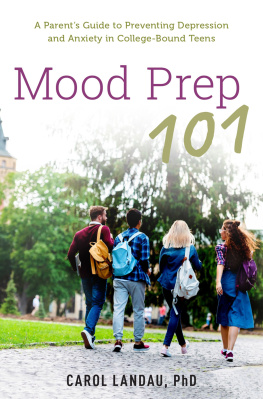
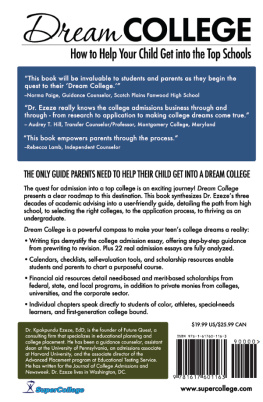

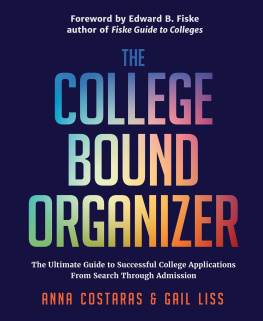
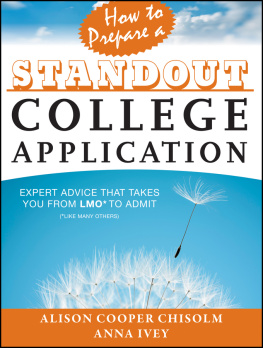
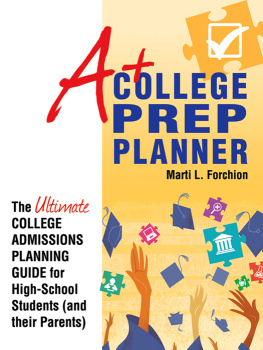
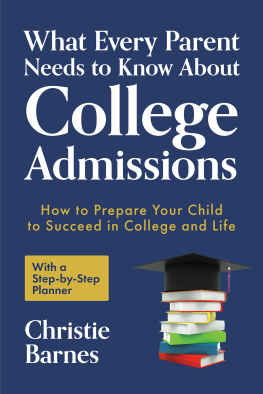




 A seventeen-year-old junior, determined to get a jump on her personal college essay, fears it will be dull because her life lacks personal tragedy. Why didnt anything bad ever happen to me? she asks her parents. She adds, with a twinge of hope, Do you think it still might?
A seventeen-year-old junior, determined to get a jump on her personal college essay, fears it will be dull because her life lacks personal tragedy. Why didnt anything bad ever happen to me? she asks her parents. She adds, with a twinge of hope, Do you think it still might?